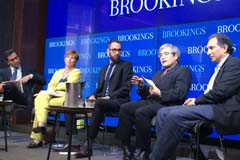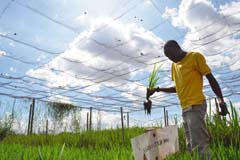JICA-RI Co-Hosts a Book Launch for "Last Mile in Ending Extreme Poverty" with the Brookings Institution
2015.08.27
Three ingredients are important to end global poverty by 2030: peace, jobs and resilience, JICA Vice President Hiroshi Kato said in a panel discussion July 23, 2015, in Washington, D.C.
The discussion was part of a launch event for a book entitled "The Last Mile in Ending Extreme Poverty." The book was a collaboration between the JICA Research Institute and the Brookings Institution, co-edited by Kato and two Brookings fellows: Homi Kharas, senior fellow and deputy director, and Laurence Chandy, fellow, Global Economy and Development.
Reductions in extreme poverty and fragility are slow to manifest and inequality has been dramatically widening. Achieving the last mile, meaning that no one is left behind in the development process, remains a central challenge of the global development agenda. With this in mind, JICA-RI has engaged since 2013 in a collaborative research project with Brookings on the topic of "global poverty and fragility." The book is the main outcome of the research findings of the project.

JICA Vice President Hiroshi Kato
(second from right)
Chandy and Kato served on the panel moderated by Kharas, along with Raj Desai, associate professor of International Development, Georgetown University and nonresident senior fellow at Brookings, and Ana Revenga, senior director, Poverty Global Practice at the World Bank.
Kato began by saying that while current trends in poverty reduction make the goal appear achievable by 2030, simply extrapolating from past trends can be problematic. In the past strides made by large countries such as China and India have masked a lack of progress or even regression by other countries, primarily in Africa. But traversing "the last mile" will be difficult because "countries will find it harder to find ways to reduce poverty and the marginal cost of reducing poverty will increase as the absolute level of poverty declines over time."

"The Last Mile" displayed at the event
After Kato's opening remarks, Kharas asked Revenga to talk about the World Bank's goals of "eliminating extreme poverty by 2030 and boosting shared prosperity, measured as the income of the bottom 40 percent in any given country."
"I think ending extreme poverty will soon be synonymous with ending poverty in Africa and in the most difficult and fragile settings because that's what it will take to reach the goal," Revenga said, adding that in fragile states "the most basic conditions for achieving poverty reduction" are lacking.
Kharas asked Desai, a political scientist, whether new political alliances will be necessary to ending poverty. Desai responded that politics will be key, and that to reduce poverty emphasis must be placed on social cohesion.
"We need to reduce targeted preferences so that the medium-level segments of society perceive more benefits to social spending. We need social protection systems that are based more on contributory mechanisms rather than on mere redistribution of wealth," he said.
Moderator Kharas noted that Japan has enjoyed low levels of inequality and asked Kato to comment. Kato said balanced investment in rural and urban areas has been a key to equality in Japan and may be useful in developing countries in Africa and elsewhere.
"Maybe we see a huge underinvestment in agriculture in Africa, and especially in rural areas, which is resulting in the massive extreme poverty in the rural areas, and also pushing the food prices in those countries up, which, again, resulting in the diminished wage competitiveness controversy in those countries," he said.
After the main discussion, a question and answer session was held. The floor with about 140 participants covered various issues on polices such as disabilities, climate change, population, education, etc.
A questioner asked about the impact of climate change on agricultural productivity, which is key to reducing poverty.
Noting that Japan has been a leader on the issue of climate change, both with the Kyoto Agreement and an emphasis on resilience in development, Kharas asked Kato for his views. Kato responded that it is important to remember that it is easier for the prosperous to build resilience into development and resilience should be implemented with inclusion of the poor in mind. He went on to say that work is going on to use new technology, including drought-resistant seeds, to make agriculture in Africa more resilient to global warming, an effort with which JICA is assisting.

Various varieties of rice are examined
at an agricultural training center in Tanzania
(Photo: JICA/Takeshi Kuno)
Another member of the audience, said science and technology in Africa have been widely neglected. He noted that innovation in science and technology has been part of the success of most developed countries, and argued that "without the same type of emphasis on science and technology, Africa will remain poor." Then he asked panelists for their thoughts.
Kato said there is a need for an emphasis on science and technology, but that must be paired with an emphasis on job opportunities.

事業事前評価表(地球規模課題対応国際科学技術協力(SATREPS)).国際協力機構 地球環境部 . 防災第一チーム. 1.案件名.国 名: フィリピン共和国.

事業事前評価表(地球規模課題対応国際科学技術協力(SATREPS)).国際協力機構 地球環境部 . 防災第一チーム. 1.案件名.国 名: フィリピン共和国.

事業事前評価表(地球規模課題対応国際科学技術協力(SATREPS)).国際協力機構 地球環境部 . 防災第一チーム. 1.案件名.国 名: フィリピン共和国.

事業事前評価表(地球規模課題対応国際科学技術協力(SATREPS)).国際協力機構 地球環境部 . 防災第一チーム. 1.案件名.国 名: フィリピン共和国.

事業事前評価表(地球規模課題対応国際科学技術協力(SATREPS)).国際協力機構 地球環境部 . 防災第一チーム. 1.案件名.国 名: フィリピン共和国.
scroll